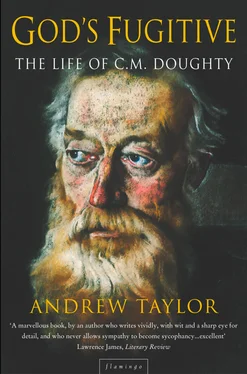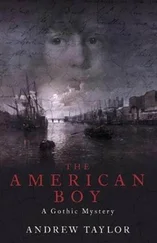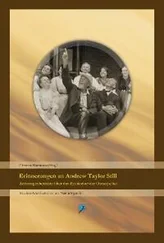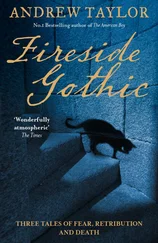He clearly enjoyed passing on his geological passion: he dragged one of the junior fellows of the college, Henry Thomas Francis, off to inspect the Kimmeridge clay at Ely and the gravel pits in Barnwell (‘When’, Francis recalled wryly later, ‘I caught a severe cold …’). Another friendship was with the future Professor John Buckley Bradbury, with whom he shared a staircase in Caius overlooking Trinity Street – Doughty’s old room, which has since been redeveloped, was above the college library where, decades later, the main collection of his private books and papers was held. The two men used to take long walks into the country, visiting the chalk pits and coprolite diggings just outside Cambridge.
Another contemporary at Cambridge, Edwin Ray Lankester, later to become a Fellow of the Royal Society and one of the country’s leading zoologists, also recalled Doughty’s application and enthusiasm. For a time Doughty had rooms opposite his, and Lankester remembered him, three years his senior, as ‘rather shy and quiet, but very kind and anxious to help me’. 24 The unassertive, awkward young man still spent much of his time and money digging at Hoxne. ‘Doughty did not take part in such things as rowing, but was always reading geology and philosophy,’ he said.
But before he could specialize in his chosen subject. Doughty had to pass the Cambridge first-year examination, the so-called Littlego. The Greek and Latin which had to be dealt with he treated with a certain amount of disdain, doing the work that was necessary without, apparently, much enthusiasm. Sixty years later his colleague of the gravel pits and the Kimmeridge clay, Henry Thomas Francis, remembered teaching him Classics.
Doughty as an undergraduate was shy, nervous, and very polite. He had no sense of humour, and I cannot remember that he had any literary tastes or leanings whatever. He read Classics with me for his Littlego. He knew very little Greek. When he came up, he was devoted to Natural Science generally. He had made a large collection of Suffolk fossils, and was rather combative in favour of the new studies. He did not like attending lectures. 25
Francis also recalled a visit from another undergraduate who announced that he was no longer going to take lessons in Classics from him.
I said, ‘Very well, but what are you going to do?’ and after a little hesitation he replied, ‘The fact is, my friend Doughty tells me you bother one with grammar and all that sort of thing, and that it is far easier to get up the whole business by heart.’ My answer was, ‘Then we are right to part, for I can’t teach Latin or Greek on those conditions.’
The young Doughty simply had no time for literature, and certainly no time for the detailed study of language: those passions would come later. For now, with his characteristic singleminded determination, he wanted to concentrate only on his scientific studies.
He had no time, either, for the religious requirements of his college. Even at Caius, which was not among the most dogmatic or conservative of Cambridge institutions, there was a strict rule demanding daily appearances at religious services, and the college’s Chapel Attendance Book shows the young Doughty cautioned twice, and punished once, for his irregular appearances. Maybe unsurprisingly, for a young man who as a boy had been forced to sit through the Revd Bernays’s thunderous sermons, he was less than enthusiastic all his life about organized worship: after his death, his widow observed in a letter, ‘He never (or hardly ever) entered a church during service, but he loved to sit in any church or cathedral for hours. He was truly religious, in spite of never going to church in the orthodox way …’ 26
But Doughty’s studies in geology were already chipping away at the foundations of his own belief in much the same way as similar research had done for Lyell. His Christianity was too closely bound up with his sense of family, of tradition, and of Englishness for him ever to disavow it; but there can be little question that poring over the fossils gathered from the Suffolk chalkland must have sown the first seeds of religious doubt in his mind.
Failing to turn up for chapel was not a grave offence, and not likely to have incurred a serious penalty – probably a small fine or a period restricted to the college grounds – but, for a young man as careful of his dignity as Doughty, any punishment would have been a humiliating experience. It was almost certainly one reason for his decision to ‘migrate’ from Caius to Downing in 1863, two years after coming up to the university – years later, The Times said that the move came ‘after a difference with the head of his original college’ 27 – but there were others.
Cambridge University as a whole was gaining a growing reputation in botany and geology – although it would be several years before anything as dangerous or innovative as a scientific laboratory would be opened – and the relatively new Downing College, anxious to improve its academic standing in the university, was offering a number of Foundation Scholarships in Natural Sciences. Doughty’s friend Bradbury had already been accepted for one of these, and although Doughty did not need the £50 a year the scholarship offered, he would have relished the academic standing it would confer.
He was disappointed, because he entered Downing without a scholarship. But simply making the transition from the quiet, enclosed courts of Caius to the wide open spaces of Downing was significant: apart from the lack of enthusiasm at Caius for the newfangled study of science, there was the rigid insistence on the need to attend not only chapel, but also lectures. Doughty wanted to study on his own, and the more easygoing atmosphere at Downing attracted him. His own explanation was straightforward: ‘They bothered me so much at Caius with lectures and chapels and things, and I knew that at Downing I could do just as I liked …’ 28 Certainly, Bradbury boasted later that he never attended a single lecture as an undergraduate at Downing – and, as an additional incentive, the college buildings did not yet boast a chapel.
There was no lasting rift with his former college – on the contrary, Doughty remained on cordial terms with Caius, took his Master of Arts there, presented the college with gifts and paintings, and even used it as a forwarding address later in his life. But for someone who felt less than enthusiastic about the entire ambience of the university, Downing was a more congenial place to live than the more staid and ancient Caius. It was a new college, a college for the modern age, and one which seemed to delight in being almost semi-detached from the university as a whole. Doughty walked away from the college where his father and his grandfather had studied without a backward glance. The young man who was to prove himself in so many ways obsessed by tradition and antiquity was showing in his choice of college, as he had in his choice of subject, that he had a strong and determined mind of his own.
There is no doubting the seriousness with which he approached his chosen field of study at Downing – but it was to be several months before he could resume his formal studies.
Throughout his life Doughty complained of weak health – and throughout his life, when it let him down, he would set off at a tangent to ‘convalesce’ in some extravagantly physical and energetic enterprise which would have taxed an athlete in the peak of condition. So it was as he started his first term at Downing: he was granted leave to postpone his final exams, and announced his intention of spending some eight or nine months surveying the fiords and glaciers of Norway.
The declared aim of his journey was the observation of the ice-flows of the Jostedal-Brae glacier field, and he fulfilled it completely enough to produce his second paper for the British Association when he returned. But those studies took only a couple of months, and much of the rest of his time was spent wandering more or less at random, in much the same way as he did later through Europe and Arabia. Before he travelled north-west to the Jostedal-Brae, he had spent some time at the university in Christiana, as Oslo was then called. The earnest young Englishman, diligently jotting down words and phrases of Danish as he struggled to build up a working vocabulary, must have been an unusual sight in the small university, which had only been founded fifty years before. Norway was a poor country: it was more customary for their students to travel abroad than for foreigners to come there.
Читать дальше












